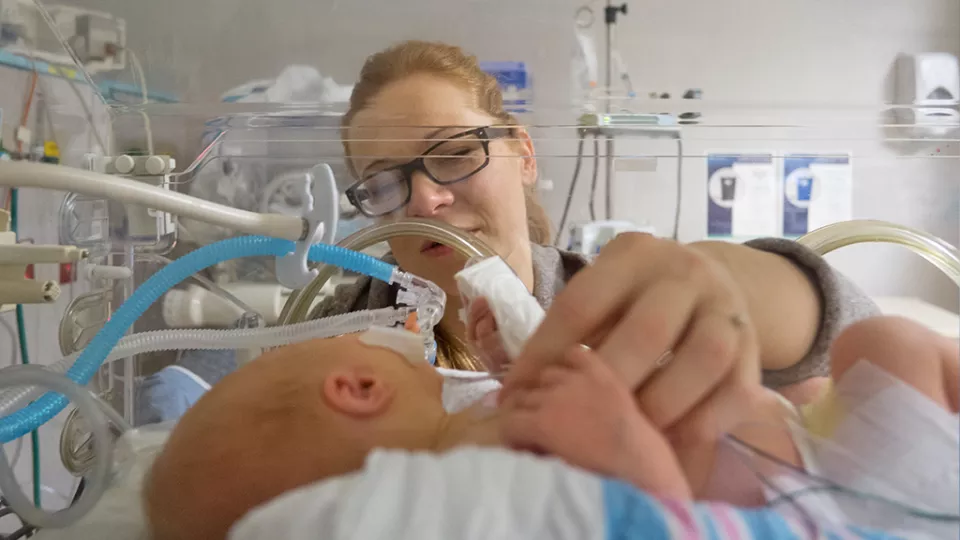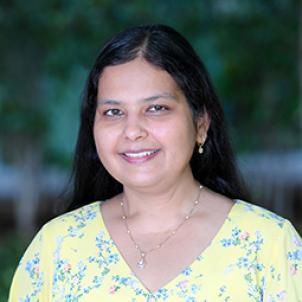
Going Beyond Lung Care for Babies With Bronchopulmonary Dysplasia

For Manvi Bansal, MD, one of the biggest challenges of caring for babies with severe bronchopulmonary dysplasia (BPD) is dealing with “the elephant in the room.”
“When a child is on a ventilator, there’s a tendency to focus everything around getting the child off that ventilator. It’s like a big elephant sitting there,” says Dr. Bansal, a pediatric pulmonologist who co-directs the Infant Chronic Lung Disease Program at Children’s Hospital Los Angeles. “But this is not just about the lungs. You really have to think about the child as a whole.”
Supporting babies with severe BPD in all areas of their development is the goal of the Infant Chronic Lung Disease Program, which provides coordinated and comprehensive care for infants and children with the condition. The highly specialized and multidisciplinary team works closely together to develop personalized care plans for each patient.
“It’s not one-size-fits-all,” says Bridget DiPrisco, MD, a neonatologist and Co-Director of the program. “We focus on individualizing care and optimizing all areas of a baby’s development, particularly neurodevelopment.”
A multidisciplinary approach
Although the program cares for babies with a range of chronic lung diseases, the majority of patients have BPD—a serious lung condition that typically affects premature infants born more than 10 weeks early.
Those babies often spend months in the hospital’s Level IV Steven & Alexandra Cohen Foundation Newborn and Infant Critical Care Unit (NICCU), where they’re followed by a team of experts—including neonatologists, pulmonologists, cardiologists, gastroenterologists, developmental pediatricians, nurses, dietitians, social workers, and physical and occupational therapists.
Earlier this year, that team began conducting weekly, multidisciplinary BPD rounds in the NICCU. The rounds have enhanced consistency in care and strengthened the team’s focus on infants’ growth and development.

“For many patients in the NICCU, we’re often working to wean support and get them home as soon as possible,” Dr. DiPrisco says. “But for babies with BPD, we have to shift our focus. You need to allow time for their lungs to grow, and along the way, make sure you’re supporting every area of the child’s development. Bringing together all of these different specialists helps ensure that we can do that.”
After babies go home, they’re followed long term in the hospital’s dedicated BPD Clinic, which launched July 1. As in the NICCU, the clinic brings together a large, multidisciplinary team of experts in one place—streamlining appointments for families and fostering comprehensive care.
One of the unique aspects of the clinic is that it includes both a pediatric gastroenterologist and an occupational therapist who specializes in dysphagia (difficulty swallowing).
“Babies with BPD not only have underdeveloped lungs, but they also have immature intestines,” says Dr. Bansal. “Many of these children experience feeding or swallowing issues, so it’s important to have an expert right in the clinic who can oversee their nutrition and provide specialized GI care.”
In addition, the clinic’s dedicated nurse manager communicates with families prior to appointments and helps to coordinate care between various specialists.
Focus on research and innovation
Children’s Hospital Los Angeles also is a member of the BPD Collaborative, an international, multicenter effort aimed at boosting research and standardizing care for children with severe BPD.
Through the Collaborative, the team participates in ongoing studies, discusses cases and shares best practices with BPD experts at other top centers.
“It’s a way for all of us to share and learn from each other, and then bring those learnings back to our patients,” Dr. Bansal says. “We all are working toward the same goal: to help every child with chronic lung disease to heal, grow and thrive.”


